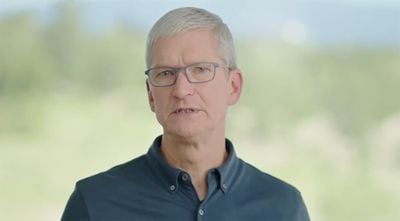Amid a heightened amount of scrutiny and tension surrounding the App Store and how users download and install apps on the iPhone, Apple CEO Tim Cook said today that customers who wish to sideload apps should consider purchasing an Android device as the experience offered by the iPhone maximizes their security and privacy.

Speaking at The New York Times "DealBook" summit, Cook said that customers currently already have a choice between wanting a secure and protected platform or an ecosystem that allows for sideloading. "I think that people have that choice today, Andrew. If you want to sideload, you can buy an Android phone." Cook drew the comparison of sideloading to a carmaker selling a car without airbags or seatbelt, saying it would be "too risky."
I think that people have that choice today, Andrew, if you want to sideload, you can buy an Android phone. That choice exists when you go into the carrier shop. If that is important to you, then you should buy an Android phone. From our point of view, it would be like if I were an automobile manufacturer telling [a customer] not to put airbags and seat belts in the car. He would never think about doing this in today's time. It's just too risky to do that. And so it would not be an iPhone if it didn't maximize security and privacy.
Sideloading, which would allow users to download and install apps directly onto their iPhone from the open internet, has become a hot topic in recent months, with Cook now weighing in. Earlier this week, Apple's senior vice president of software engineering, Craig Federighi, said that sideloading is a "cybercriminal's best friend," highlighting the dangers that may be presented to customers if offered the freedom to install apps from anywhere on the web.
In a paper published in October, Apple shared some facts about the security and privacy of the iPhone compared to the Android ecosystem. In the paper, Apple said that studies have shown that Android smartphones have been attacked by mobile malware between 15 and 47 times more than malware targeting the iPhone. "This is closely linked to sideloading," the paper added.
Speaking generally on privacy, Cook was questioned on recent reporting revealing that Facebook, Google, Snapchat, and others have lost almost $10 billion in revenue this year due to Apple's App Tracking Transparency prompt, which requires developers to ask for a user's consent before tracking them. Declining to comment on the specific numbers, Cook did repeat that Apple believes privacy is a fundamental human right.
I don't know about the estimates, Andrew, so I can't testify to those kind of numbers, but I think that from our point of view, privacy is a basic human right. And the people that ought to be deciding whether to data share is the person themselves. And so what we have been all about is putting the power with the user. We are not making the decision, we are just simply prompting them to be asked if they want to be tracked across apps or not. And of course, many of them are deciding no and never wanted to be, it's just that they did not have a choice before. And so I feel really good and I'm getting great feedback from users about having the choice.
Apple is in multiple investigations and battles around the world regarding the App Store, with the one most likely to produce drastic change being South Korea. Last month, the country passed new rules prohibiting platform owners from limiting developers to using only a single payment method for in-app purchases.
The App Store's in-app purchase method, which developers are required to use for digital purchases made within apps, gives Apple a 15-30% commission on all purchases made. Cook noted today that Apple has only ever lowered the commission, never increasing it. Nonetheless, the new law in South Korea would represent a significant turning point for the App Store if fully enacted. The App Store operates under a single global set of rules, and any change in one jurisdiction is applied globally for all developers.
























